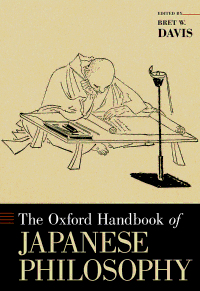
Preview The Oxford Handbook of Japanese Philosophy
Title Page Page: ii Copyright Page Page: iv Dedication Page: v Contents Page: vii Preface Page: xi Contributors Page: xv What Is Japanese Philosophy? Page: 1 Part I Shintō and the Synthetic Nature of Japanese Philosophical Thought Page: 81 1 Prince Shōtoku’s Constitution and the Synthetic Nature of Japanese Thought Page: 83 2 Philosophical Implications of Shintō Page: 97 3 National Learning: Poetic Emotionalism and Nostalgic Nationalism Page: 111 Part II Philosophies of Japanese Buddhism Page: 127 4 Saichō’s Tendai: In the Middle of Form and Emptiness Page: 129 5 Kūkai’s Shingon: Embodiment of Emptiness Page: 145 6 Philosophical Dimensions of Shinran’s Pure Land Buddhist Path Page: 159 7 Modern Pure Land Thinkers: Kiyozawa Manshi and Soga Ryōjin Page: 181 8 The Philosophy of Zen Master Dōgen: Egoless Perspectivism Page: 201 9 Dōgen on the Language of Creative Textual Hermeneutics Page: 215 10 Rinzai Zen Kōan Training: Philosophical Intersections Page: 231 11 Modern Zen Thinkers: D. T. Suzuki, Hisamatsu Shin’ichi, and Masao Abe Page: 247 Part III Philosophies of Japanese Confucianism and Bushidō Page: 271 12 Japanese Neo-Confucian Philosophy Page: 273 13 Ancient Learning: The Japanese Revival of Classical Confucianism Page: 291 14 Bushidō and Philosophy: Parting the Clouds, Seeking the Way Page: 307 Part IV Modern Japanese Philosophies Page: 331 15 The Japanese Encounter with and Appropriation of Western Philosophy Page: 333 The Kyoto School Page: 365 16 The Kyoto School: Transformations Over Three Generations Page: 367 17 The Development of Nishida Kitarō’s Philosophy: Pure Experience, Place, Action-Intuition Page: 389 18 Nishida Kitarō’s Philosophy: Self, World, and the Nothingness Underlying Distinctions Page: 417 19 The Place of God in the Philosophy of Tanabe Hajime Page: 431 20 Miki Kiyoshi: Marxism, Humanism, and the Power of Imagination Page: 447 21 Nishitani Keiji: Practicing Philosophy as a Matter of Life and Death Page: 465 22 Ueda Shizuteru: The Self That Is Not a Self in a Twofold World Page: 485 Other Modern Japanese Philosophies Page: 501 23 Watsuji Tetsurō: The Mutuality of Climate and Culture and an Ethics of Betweenness Page: 503 24 Kuki Shūzō: A Phenomenology of Fate and Chance and an Aesthetics of the Floating World Page: 523 25 Comparative Philosophy in Japan: Nakamura Hajime and Izutsu Toshihiko Page: 543 26 Japanese Christian Philosophies Page: 563 27 Yuasa Yasuo’s Philosophy of Self-Cultivation: A Theory of Embodiment Page: 575 28 Postwar Japanese Political Philosophy: Marxism, Liberalism, and the Quest for Autonomy Page: 591 29 Raichō: Zen and the Female Body in the Development of Japanese Feminist Philosophy Page: 613 30 Japanese Phenomenology Page: 631 31 The Komaba Quartet: A Landscape of Japanese Philosophy in the 1970s Page: 649 Part V Pervasive Topics in Japanese Philosophical Thought Page: 663 32 Philosophical Implications of the Japanese Language Page: 665 33 Natural Freedom: Human/Nature Nondualism in Zen and Japanese Thought Page: 685 34 Japanese Ethics Page: 719 35 Japanese (and Ainu) Aesthetics and Philosophy of Art Page: 735 36 The Controversial Cultural Identity of Japanese Philosophy Page: 755 Index Page: 781
Description: